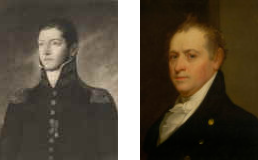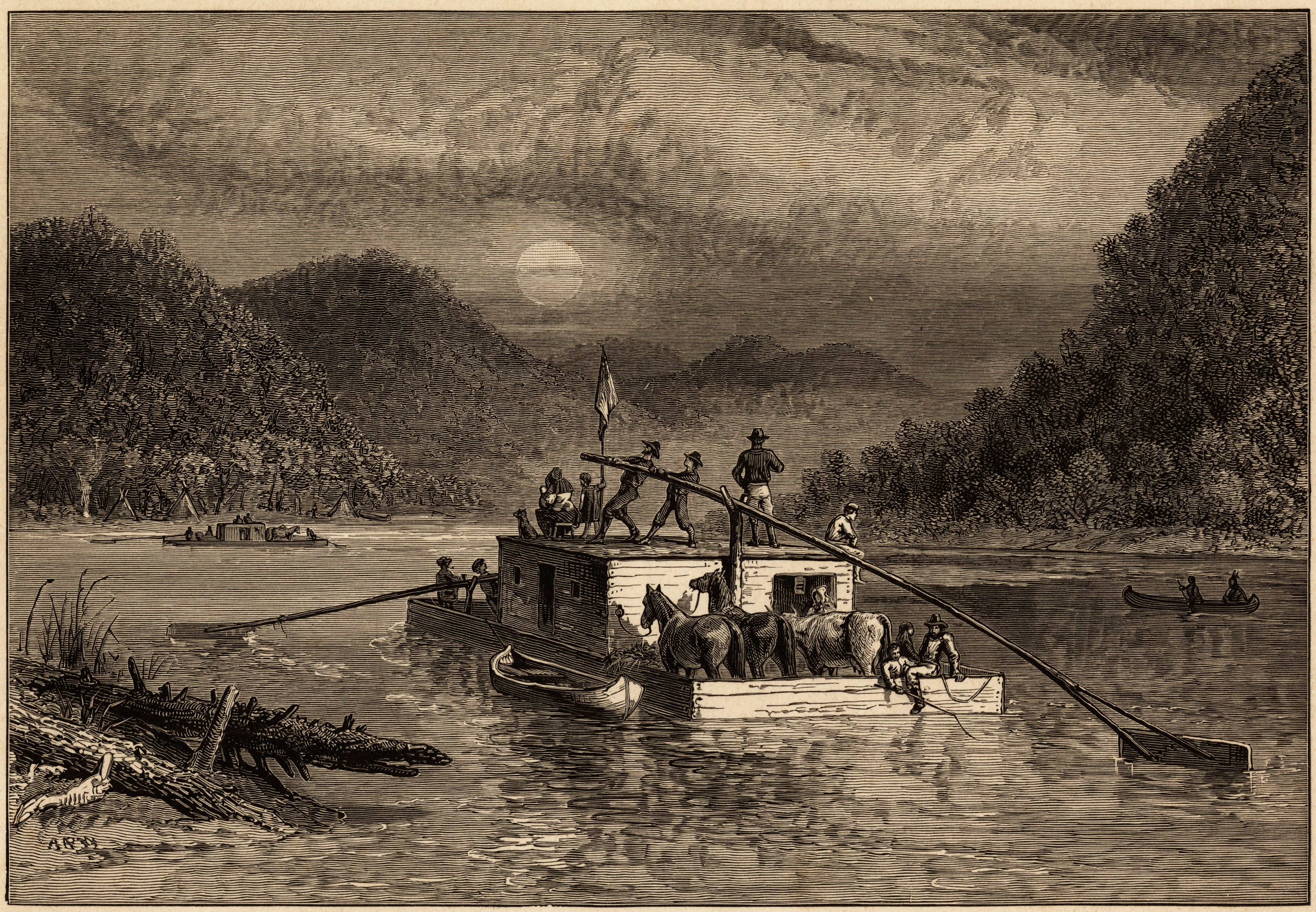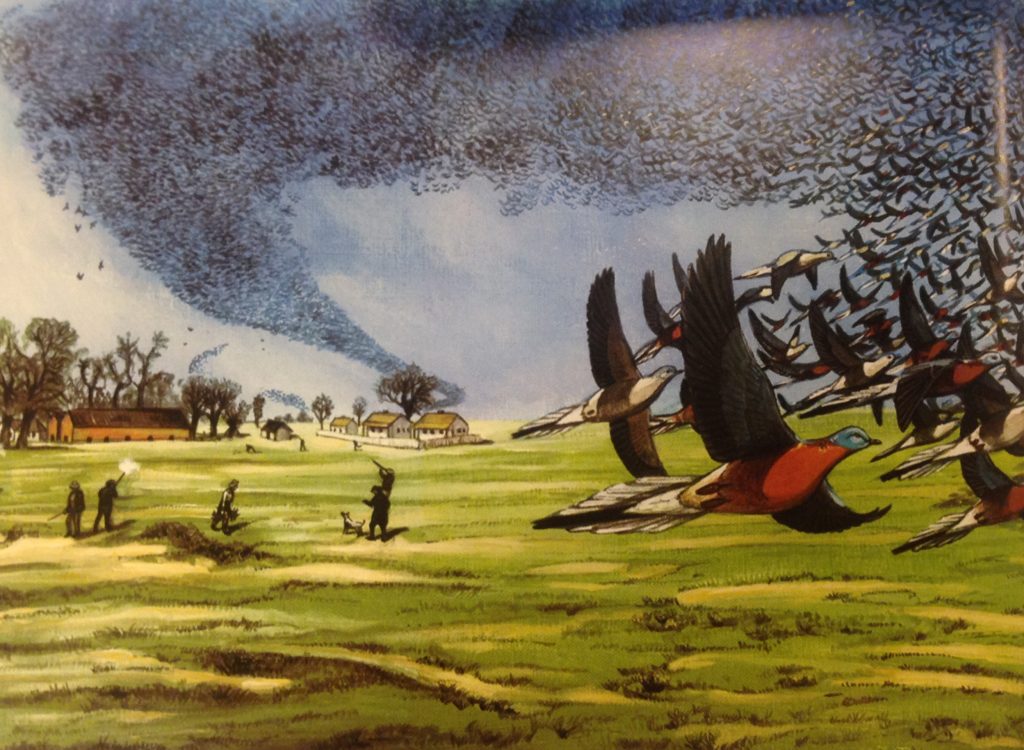Letters from Caleb Townes
Although much is known about the two men to whom Caleb Townes wrote his letter, little is known of Caleb himself. He was obviously intelligent and probably a man of some resources and a great promoter of the west. This letter is written on March 6, 1815 in Vincennes, Indiana to George Gibbs (left) and Oliver Wolcott (right).

Gentlemen
… My Whole rout[e] through this country was highly interesting…at the head of the Allegheny Waters I found the first specimens of Marine petrifactions… after this I found them all the way down to the falls of the Ohio at Louisville- here they abound on the rock over which the Water falls, but which at low boating is dry –you will find almost every thing you can imagine and an abundance you can not imagine. – Marine productions Scallop shells-Coral of various kinds-Buffalo Horns- Hornet Nests – Wasps Nests – Various Animal as well as Vegetable substances – the whole Mass appears a conglomeration of various objects rolled up in calcareous Matter.
I took my passage in … a flatt boat covered in on all sides at at top about 30 feet long and 15 broad – loaded with peltry and furs from Mackinaw – this mode of traveling was quite new to me …I left Pitt[sburgh] in a Keel – a long boat much resembling the inland boats of the Delaware except that they have the addition of a board covering…New towns are growing up all along the river, as well as all through the Country – Marietta is a decent place. Here I first saw those unaccountable Monuments of Antiquity – the Mounds – Walls- elevated plains – squares –circles ….What all these Monuments could ever have been constructed from I am utterly at a loss to imagine. This certainly gives the idea of a regular fortification- but the mounds- which are numerous over this western Country I am at a loss to find a motive…
Near Vincennes there are four large ones in view of the town – I have with others measured by pacing the circumference of several…We have satisfactory evidence of this country having experienced three different states of occupancy – First, By the Marine World: second by a numerous population of the Human family – but whether they were ever advanced to that state of society we designate as “cultivated”, I am… at a loss to decide – I have seen instances of neat pottery… in an near some of the Mounds. … Unquestionably this part of the World has sustained a very large population but what has carried them off so completely or When, remains an inscrutable mystery. …
On my arrival in Louisville, which I found to be an active place of business;… I crossed over to a villiage called Jeffersonville containing about a dozen houses’ along a bank… overlooking the rapids below… After paying respects to the Governor (Posey) who resides at this place at present, I set off in the company of an officer of the Rangers and immediately entered the Wilderness, and met but with 3 houses and but a few very indifferent cabins the whole 120 mile distance. Our company was soon increased to 10, and part way 12. We got along pretty well; experiencing but few privations more than we expected, therefore we did not find much fault –

The first and second days travel about 60 miles was through beach wood and the number and quantity of pidgeons were beyond all credibility.[Note: the birds to which he is referring are the now extinct passenger pigeons] A place called emphatically, the “pegeon roost” where these birds retire from the severity of the northern winters cannot be described – nor obtain belief, were it described – at least 50 acres of woods in one area totally stripped of their limbs many of the trees of a foot diameter actually broken down to the ground by the numbers and weight of the Pigeons. The destruction of timber is inconceivable; and it is very extraordinary that they every winter retire here… making a havock in the timber that cannot be credited and covering the ground with their droppings from 12-18 inches deep. They drive off in immense flocks through the Beech Woods … and sweep up all the mast to the great injury of the hog proprietor – they are in a word, a great nuisance to the Country.
The Paroquet is also in considerable abundance and extremely troublesome and injurious to the farmer destroying his corn and fruit of all Kinds- They will sometimes sweep a whole orchard of the fruit, not merely by eating but by biting the fruit and cutting the stems –[The Carolina Parakeet is also now extinct] The County all the way through is indeed excellent land- a few Hills, called the Knobs, 7 miles from Jeffersonville and a range of Hills near White River filled with Iron ore, are all the Hills worth naming. …All the land of this territory, with the exception of a small ranger of Hills, which run from the Ohio northerly for about 100 miles, and the low grounds south of the mouth of the White River, 20 miles below this, on the Wabash, may be considered second to none in the World….. It is rapidly settling.
Your friend, Caleb Townes



